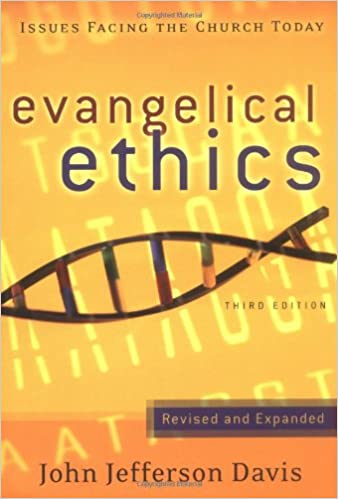A Brief Book Summary from Books At a Glance
by Steve West
About the Author
John Jefferson Davis is Professor of Systematic Theology and Christian Ethics at Gordon-Conwell Theological Seminary. He has written numerous books and articles on theological and ethical issues.
Introduction
In this widely used textbook, Davis canvasses standard ethical issues from an evangelical perspective. He holds to a deontological perspective that is rooted in biblical authority. Davis surveys the historical development of the various issues, examines biblical teaching, and strives for fair contemporary application and analysis. Written at an introductory level and covering a wide variety of issues, Davis aims for the most relevant points in every discussion.
Table of Contents
Chapter 1 Dimensions of Decision Making
Chapter 2 Contraception
Chapter 3 Reproductive Technologies
Chapter 4 Divorce and Remarriage
Chapter 5 Homosexuality
Chapter 6 Abortion
Chapter 7 Infanticide and Euthanasia
Chapter 8 Capital Punishment
Chapter 9 Civil Disobedience and Revolution
Chapter 10 War and Peace
Chapter 11 Environmental Ethics: History, Issues, and Theology
Chapter 12 The Genetic Revolution
Summary
Chapter 1: Dimensions of Decision Making
Christians are required to make decisions about ethical issues that are literally matters of life and death. Our technological capabilities have far outstripped our moral judgment—we are able to do many, many things, but we have lost the wisdom required to know what we ought to do. God’s Word is our authority and standard. Christian ethics are prescriptive and deontological (i.e. obligatory). The Bible does not talk about everything, but it does contain the principles that are required for reasoning in a moral framework. Facts must be interpreted in a biblical worldview, and our reasoning must be guided by Scripture and the Spirit. We must act in love, but love is defined by God’s revelation. Love for God is demonstrated by keeping his commands.
In any dilemma, there is a course of action that is free from sin. We have a duty to obey human authorities, but our duty to God is a greater ethical obligation. If a firefighter breaks down a door to save a life, they are guiltless of property damage. Rahab was in the context of war, and in war deception and trickery is part of the expected behavior between enemies. She saved lives by deceiving Israel’s enemies: this was not the lesser of two evils, it was a morally blameless act. In America, the idea of the separation of church and state is being abused. The government cannot set up a state religion, but religious beliefs are supposed to be respected and heard in the public square. General revelation and our creation in the image of God mean that there are ethical laws ingrained in our consciences. Christians should work hard to get laws passed which relate to the moral principles that are revealed through general revelation. . . .
[To continue reading this summary, please see below....]The remainder of this article is premium content. Become a member to continue reading.
Already have an account? Sign In
Buy the books

EVANGELICAL ETHICS: ISSUES FACING THE CHURCH TODAY, 3RD EDITION, by John Jefferson Davis